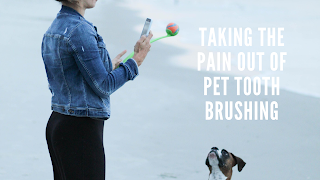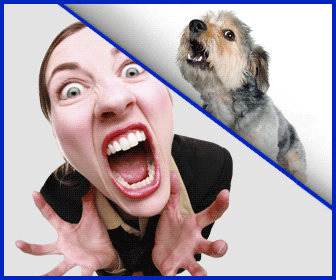Taking The Pain Out of Pet Tooth Brushing
Animal Doctor: Taking The Pain Out of Pet Tooth Brushing
Taking The Pain Out of Pet Tooth Brushing
Your vet has bombarded you with messages about the importance of maintaining your pet's oral hygiene, but you can't seem to get a toothbrush near the little furball's teeth without a struggle. So what you do when your cat or dog suddenly develops a case of lockjaw every time you appear with a toothbrush in your hand? Here are a few ideas to help you get on track:
1. Start Slowly. "Get puppies and kittens used to having their mouths opened and work on rubbing their gums with your fingers," says Dr. Michael Farber, Practice Owner and Chief of Staff at West Chelsea Veterinary. "Do a little at a time and gradually build up to a soft brush."
With older animals, "start with just brushing one or two teeth at a time. Try to keep them distracted and always reward them," says Farber.
2. Work With the Animal's Instincts. Pets will often want to shut their mouths, so let them. Dr. Stephen Riback, an expert in veterinary dentistry at The Animal Medical Center suggests that brushing will be more effective if you hold your pet's muzzle shut, rather than trying to open it, "For me, the easiest method is to hold their muzzle shut with one hand, lift the lip with the index finger of the same hand and then brush the outer surface of their teeth with a soft-bristled toothbrush or finger brush using the other hand," he says. Pets mainly develop plaque and tartar on the outer surfaces of their teeth, says Riback, so this method will allow you to tackle the main problem areas.
3. Make It Easier on Yourself. If you can, try to have another person on hand to hold your pet still while you're brushing him but if you have to do the deed on your own, "holding them in your lap or between your legs will keep your hands free for brushing," says Farber.
4. Stick With It. It will take time and work to desensitize your pet to the toothbrush, says Riback, but it's worth it. Once you gain their trust they'll eventually allow you to brush their back teeth, which are often neglected because they are hard to reach.
In the meantime, until you and your pet get into the groove of regular brushing, you can feed your pet treats and special foods to aid in their dental health. "Foods with the VOHC (Veterinary Oral Health Council) approval have been shown to decrease the plaque and tartar index to reduce periodontal disease," says Riback. Treats with the same VOHC approval have also proven to be helpful."
Animal Doctor: Pest poison can harm all animals
DEAR DR. FOX: Please tell people about the dangers of killing mice and moles with poison. You know, the kind that you buy at the grocery store.
If that critter doesn't die right away and gets out of your home, any other animal could catch it and die from eating it. In fact, your own pet could end up eating it.
I catch the critters and take them outside. Then I put it and a slice of bread under the woodshed. -- J.B., Delanson, N.Y.
DEAR J.B.: Thanks for the reminder! Any dog or cat outdoors that eats a poisoned rodent or the poisonous bait could die. The most common poison is an anticoagulant that causes internal bleeding -- a slow and horrible way to die.
Just like their political preferences and religious prejudices, people continue to shock me with their callous indifference toward fellow creatures and the natural world.
DEAR DR. FOX: We have a 3-year-old Pomeranian in good health. We take her to the vet for checkups and all the necessary shots. However, we've noticed some foul halitosis during the last year or so. Her teeth are in good shape, and she receives dry food as well as a small amount of our food after supper, so she and our Jack are included in the family ritual.
We were wondering whether there was some natural help for this problem. We love to cuddle her on our laps, but sometimes her breath makes it very hard. -- N.M., Brentwood, Md.
DEAR N.M.: Halitosis is all too common in dogs and cats even when a dental exam gives them a clean bill of health.
Microparticles of processed food can create a film over the teeth that encourages bacterial proliferation and can lead to halitosis. So get your dog used to a daily tooth brushing and provide a piece of raw marrow to chew on. A home-prepared, whole-food diet maybe your best solution. Halitosis could also mean liver or kidney problems, especially in older animals. Your dog's breed is prone to kidney disease and associated dental problems, so regular monitoring and annual vet checkups are called for.
HEALTHIER HEARTS FOR CAT OWNERS
Researchers at the University of Minnesota have found that cat ownership was linked to a 40 percent lower risk of fatal heart attacks. We have known for several years that dogs can do this, but now cats can keep us well, too. It is well documented that animals can heal us and be important for child development and adult emotional maturity. So more pets and fewer pills, please!




